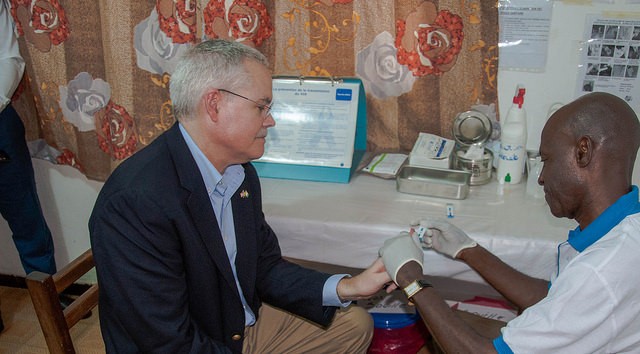As Côte d'Ivoire grows into an emerging economy after decades of economic and political instability, the country faces significant health challenges. HIV prevalence is 2.7 percent among the general population and much higher among key and priority populations. The total fertility rate is five children per woman, and 27 percent of women have an unmet need for quality family planning services. The regional Ebola virus outbreak highlighted the country’s lack of health infrastructure capacity or readiness plans to adequately respond to such a crisis. These are the reasons why the American people, through the United States Agency for International Development (USAID), are investing strategically in leadership, governance and capacity building of a sustainable health system for a healthier future in Côte d'Ivoire.

US Embassy Abidjan DCM Andrew Haviland demonstrates the new rapid HIV test available
Micah Clemens - USAID Côte d'Ivoire
Achieving an AIDS-free Generation in Côte d'Ivoire
USAID is undertaking a comprehensive, multisectoral approach towards the HIV/AIDS epidemic in Côte d'Ivoire that expands access to prevention, care and treatment services. For more than 10 years, USAID’s Health Office has worked closely with other U.S. Government agencies to help save the lives of those suffering from HIV and AIDS in Côte d’Ivoire through the President’s Emergency Plan for AIDS Relief (PEPFAR). USAID’s PEPFAR programs in Côte d'Ivoire include community based supports for HIV services, supply chain strengthening to ensure access to lifesaving treatment, orphans and vulnerable children programs, evidenced-based combination prevention programming, and strategic information analysis. USAID partners with the Ivoirian government, the private sector, and non-governmental organizations provide services to people living with HIV and AIDS and aims to help control the epidemic through targeted programs and partnerships.
Ending Preventable Maternal and Child Death
The needs for Family Planning and Reproductive Health services for women and adolescent girls are high in Côte d'Ivoire. In addition to the unmet need for family planning services, nearly one-third of all adolescent girls have given birth or are currently pregnant. The Government of Côte d'Ivoire has committed to bold family planning goals, in line with the Ouagadougou Partnership and FP 20/20 Initiative. USAID is supporting the GOCI to achieve this ambitious vision through a revised, costed National Family Planning Strategy. To build on this commitment, in 2014, USAID launched a family planning service delivery program, Agir-PF, to increase demand for and access to high quality family planning services. These investments in family planning are key to helping Côte d'Ivoire achieve sustainable development, lower the maternal mortality rate, and improve child health.
Responding to Emerging Health Threats
Through the President’s Global Health Security Agenda, USAID is working closely with its partners to prevent, detect, control, and respond to emerging disease threats. These partnerships are broadening USAID’s ongoing health systems strengthening programs for a sustainable national capacity to respond to emerging health threats. As part of a whole-of-government response, USAID led workshops connecting national health authorities with experts to develop a national Ebola preparedness and response strategy. USAID is undertaking health and behavior change campaigns and plays a key leadership role in prevention of future zoonotic disease outbreaks through the Emerging Pandemic Threats program.








Comment
Make a general inquiry or suggest an improvement.